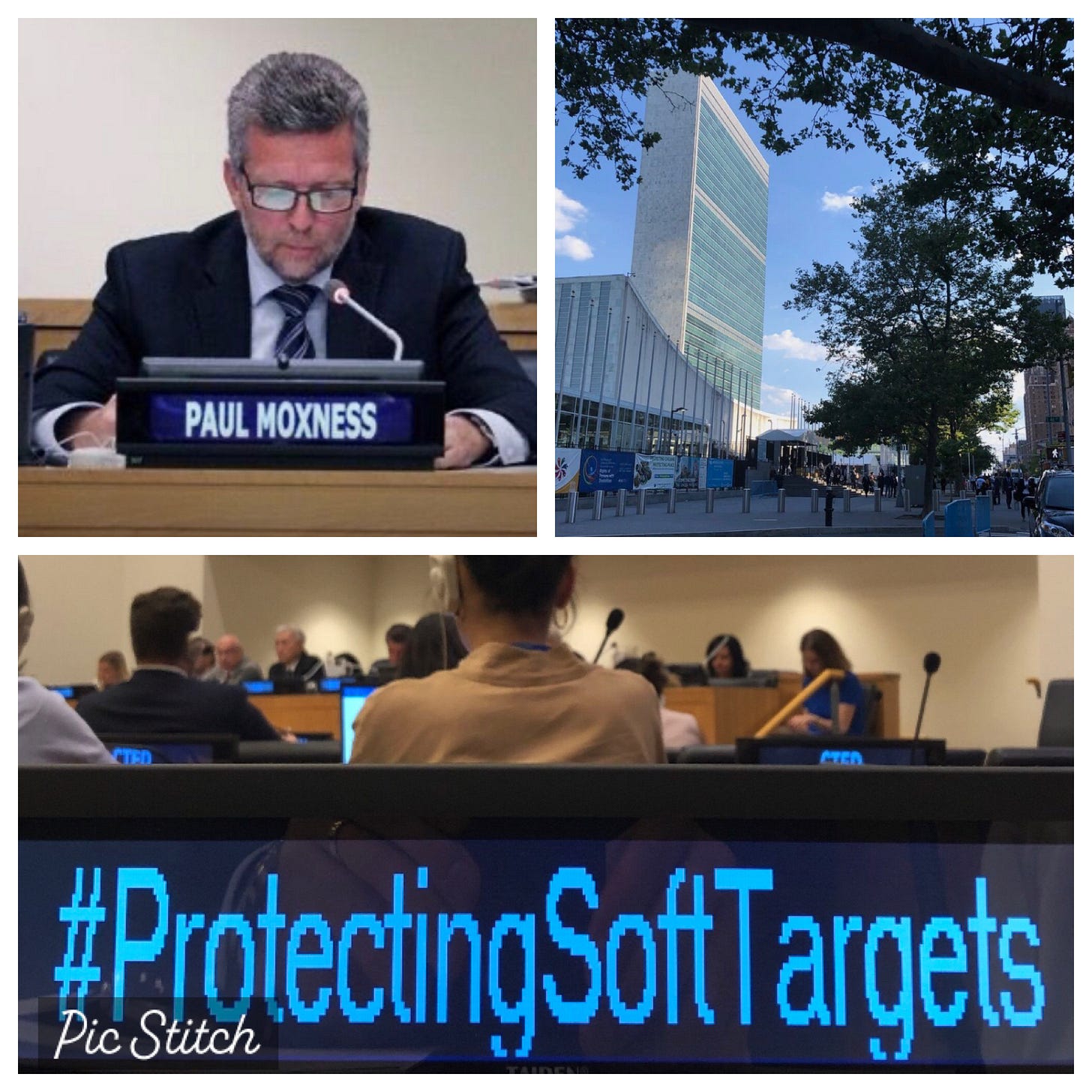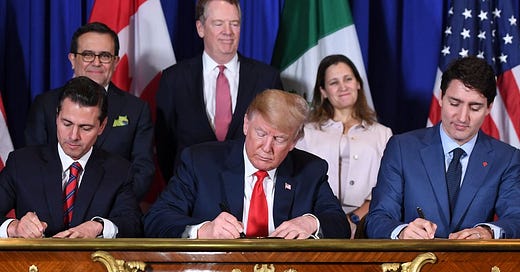How the Business Growth Mindset is Destroying Diplomacy
And maybe democracy...
For decades, business leaders have been told that growth is the only metric that matters. If you’re not expanding, you’re falling behind. If your competitors have an edge, acquire them. If someone has a resource you need, find a way to take control. It’s an aggressive, zero-sum mindset—one that has shaped the way the corporate world operates.
But what happens when this mentality bleeds into diplomacy?

Acquisition as Strategy—From Startups to Sovereignty
In the tech world, competition doesn’t always mean innovation. Increasingly, it means buying up the competition before they can become a threat. Google absorbs potential search and AI challengers. Meta swallows promising social media platforms. Amazon buys its way into new industries. Instead of allowing space for fair competition, the dominant players ensure the field is tilted in their favour.
Now look at how global powers behave. Instead of developing genuine partnerships, there’s a growing pattern of bypassing diplomacy to focus on takeovers.
The world should expect democratically elected leaders to respect the sovereignty of other nations, but that’s not happening these days.
In 2019, the U.S. seriously considered buying Greenland—not because of its people or culture, but because it holds strategic resources and a military advantage in the Arctic. Since being elected again, President Trump has become even more vocal, threatening to take over Greenland “one way or another”. Not exactly the language of diplomats.
Political figures in the U.S. occasionally float the idea of annexing Canada, not through war, but through economic and political dominance—absorbing its water, energy, and natural resources in the process. Again, since the election, president Trump’s calls for Canada to become the 51st State have intensified while exposing that he has no respect for another nation’s sovereignty, nor does he understand how subsidies and trade deficits differ.
China’s Belt and Road Initiative also aligns with a mindset of corporate expansionism, offering “investments” that give Beijing increasing leverage over infrastructure and economies worldwide.
These aren’t traditional diplomatic efforts aimed at building lasting relationships. They’re acquisition strategies—focused on control rather than cooperation.
The Loss of Diplomacy in a World Obsessed with Dominance
Diplomacy, at its core, should be about communicating, collaborating, contributing, and caring. It should recognize that power doesn’t always have to be centralized, that different nations and cultures can thrive in parallel without needing to absorb one another.
But the modern growth-at-all-costs mindset has eroded this approach. When everything is seen through a business mind’s lens of acquisition, true diplomacy becomes impossible. Relationships aren’t built on trust—they’re built on leverage. Trade isn’t about mutual benefit—it’s about securing an upper hand. Negotiation isn’t about balance—it’s about extraction.
If this approach continues unchecked, we’ll be left with a world where a few dominant players hoard resources and dictate terms, while everyone else fights to survive—just as we’ve seen happen in the tech industry.
A Proven Alternative: Collaboration Over Competition
The idea that success has to come at someone else’s expense is simply not true. There are industries—and leaders—that prove a collaborative approach benefits everyone.
During my corporate career, I was a founding member of the OSAC Hotel Security Working Group, where chief security officers from major global hotel groups set aside competition to collaborate, share information, and conduct seminars and educational sessions around the world.

We weren’t trying to make our hotels safer than other hotels—we were working to make all hotels, and travel in general, safer, more secure, and ultimately more profitable for everyone.
That mindset—communicate, collaborate, contribute, and care—allowed an entire industry to rise together rather than race against each other. And it worked. One of our achievements was a series of joint workshops held around the world for hotel and security managers irrespective of their hotel chain affiliation. During my time in the working group a combined 1000+ people attended the events from Mumbai to Doha, Istanbul to Bangkok, Jakarta to Shanghai, and from Delhi to Valetta.
Why? Because true security—like true diplomacy—isn’t a zero-sum game. One hotel being safer doesn’t mean another has to be less safe. One country growing stronger doesn’t mean another must weaken.
A Better Path: Leadership That Prioritizes Cooperation
Not all leaders follow the acquisition-first mindset. Some have shown that growth and success don’t have to come at the expense of others.
Mark Carney has worked to redefine economic progress by integrating climate responsibility and financial stability, proving that business and sustainability can go hand in hand.
Sanna Marin and Mette Frederiksen have demonstrated that social equity, sustainability, and innovation can thrive together, showing that leadership doesn’t have to be about dominance. Perhaps this helps explain why their two respective countries, Finland and Denmark, consistently top the list of the World’s Happiest Countries.
Paul Polman led Unilever in a way that prioritized long-term sustainability over short-term profit grabs, proving that corporate success can be collaborative and ethical.
Ilkka Paananen, CEO of Supercell, has built a company culture centered around trust and shared decision-making, showing that leadership doesn’t have to be about control—it can be about empowerment.
What these leaders have in common is that they understand true success isn’t about hoarding power—it’s about creating shared value. They embrace the idea that a thriving world requires cooperation, not conquest.
The Future of Diplomacy: A Shift in Mindset
The corporate mindset of aggressive expansion has created massive wealth and technological progress, but it has also stifled competition, limited innovation, and widened inequality. If diplomacy continues down the same path, the consequences could be far worse—fueling conflict, economic instability, and global resentment.
It doesn’t have to continue.
The solution already exists.
The hotel security working group proved it.
The leaders mentioned above prove it.
The answer is not about growing at someone else’s expense—it’s about growing with them.
What if, instead of treating diplomacy like a hostile takeover, we started treating it like a strategic partnership?
What if nations focused on co-investing in stability rather than fighting for sole control over the future?
We often hear leaders talk about business lessons in government—but maybe it’s time for government to teach business something about cooperation, sustainability, and shared success.
I know some people will call me naive, but those who do will have experienced but a fraction of what I have since I wandered out into the world. I have experienced and been part partnerships that went far beyond what individuals can achieve, even if they are billionaires.

Remember the mantra that drives the mindset that will create peaceful, prosperous future: Communicate, Collaborate, Contribute, and Care. Always Care!
Stay safe, Always Care

Hi! I’m Paul. I was born, raised, and currently live in Canada. After high school, I embarked on a gap year in Europe. It lasted four decades. I went to university in Norway and started my hotel career in the basement of a five-star hotel in Oslo. The manager who hired me told me I was too old, too educated, and had too many opinions to be a security guard. He also told me that the only other person who applied for the job didn’t want it.
Thirty years later, I left that same company. It had grown from a small regional hotel chain in Scandinavia to become a large, global, multi-brand company. I moved from Norway to Denmark to Belgium. The company awarded me their highest individual honour for leadership, and security professional peers selected me as the world’s most influential corporate security executive.
I’m a hospitality professional. I’m a security professional. If you ask, I will tell you that security was my job, and hospitality was my business.
Today, I’m an educator and a consultant passionate about hotels, hospitality, and keeping people safe during their travels.
In addition to the Always Care Community, I also write for Risk Resiliency’s Keep Travel Safe. If safe, secure hospitality, hotels, and travel are important to you, please subscribe to KTS!
Written with the clarity of hindsight, the accuracy of a faded memory, and countless creative liberties, the Always Care Community is a newsletter of how life has made me an emigrant, an immigrant, and gifted me experiences I never dreamed possible.
Thanks for reading. Your support is my motivation and I’m genuinely grateful that you’re here. Please share, subscribe, and connect with me.




I've been following the Greenland/Canada threats but hadn't seen these particular clips. It's all so anxiety-inducing. My theory is that the people managing Trump know that the US is not going to be getting richer by bringing steel factories back to the US, as Trump once campaigned on, nor through tech, which is topping out. Objectively, the only (terrifying) solution is to become richer by acquiring more resources, which is also their main interest in any Ukraine peace deal. It makes my head spin.